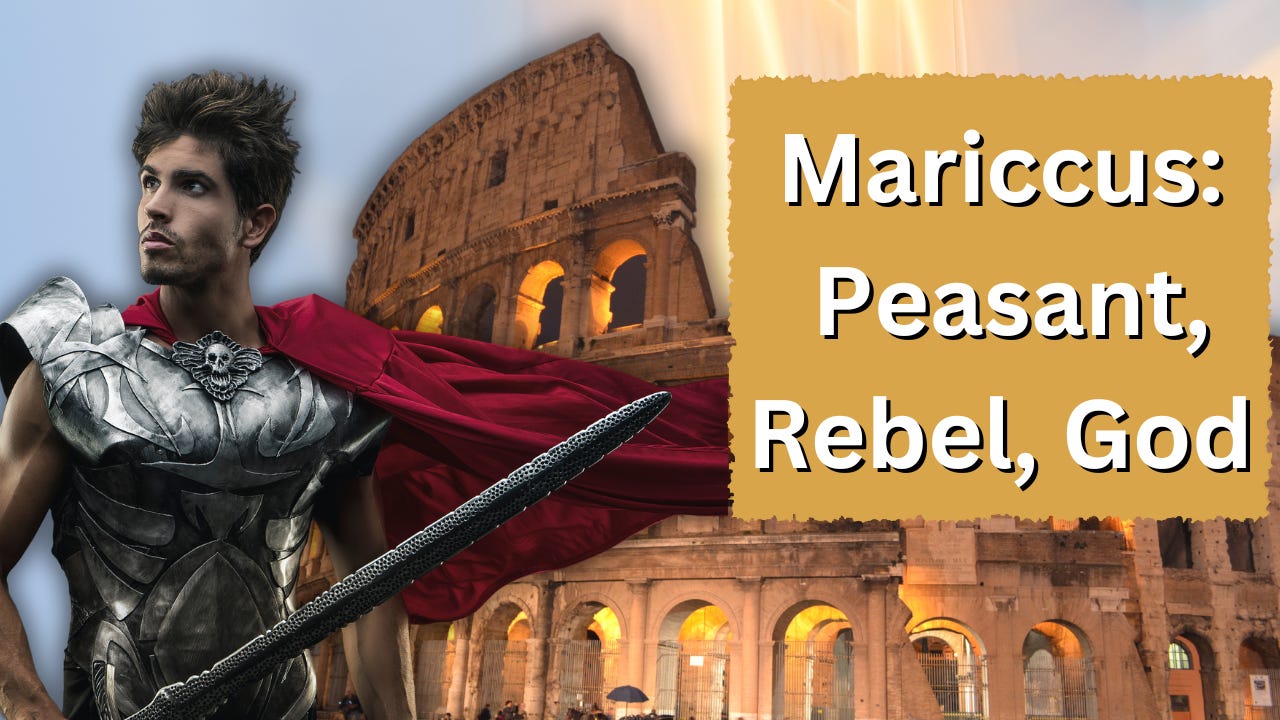Do you know anyone who preached a message of liberation, believed he was a god, was killed by the Romans, even though the people thought he was unable to be killed?
No, this was not Jesus of Nazareth, it was in fact Mariccus of Gaul.
A gallic peasant who claimed to be a god and led an uprising against the Romans.
It’s an interesting story.
To read further, consider joining the “Aviary” by taking out a paid subscription, only $7 per month or $75 per year, supports me in my ministry and scholarship, and gets you 3-4 posts per week on biblical studies, Christianity and gender relationships, cultural commentary, book reviews, previews of my forthcoming books, and some cool videos.
The year was 68 AD, Nero had committed suicide the previous year, and the new emperor Galba had just been assassinated by the praetorian guard after a mere eight months in the top job because he failed to give them a generous donative. As a result, Marcus Salvius Otho had been named as the new emperor, and he was quite happy to pay off the praetorians, in fact, he probably put them up to killing Galba. But not everyone was happy to have Otho, one of Nero’s old drinking buddies, as the new imperial supremo. Including a senator called Vitellius, a guy so fat he probably had the nickname “Obeseous,” he refused to recognize Otho as the new emperor. And Vitellius, fat guy or not, was the commander of the legions on the Rhine, which was a considerable army behind him. And he was popular with the troops. Vitellius was more into feasting four times a day than the hard work of soldiering. He was more like, “Hey guys, put down those swords and come and help eat these six swans.” There was a revolving door of emperors and the Rhine legions probably thought, “Hey why not our guy, we might be committing treason, but if it works out, we’re gonna get free lunches forever.”
Vitellius began his march towards Italy, but got slowed down, not because he was a hefty El hefe but because he came across a Gallic peasant named Mariccus who got in his way.
Mariccus was not running defense for Otho or the Roman senate, no, like many tribes, he realized that a Roman civil war and power vacuum was a terrible thing to waste.
We don’t know much about Mariccus. All we know is that he was from the Boian tribe in Cisalpine Gaul. While Vitellius was ensconced in Lugdunum, out in the nearby countryside, Mariccus declared himself a king and living god of the old Celtic deities who had been sent to liberate the Gauls from the yoke Roman rule. His message spread successfully at first because he managed to raise an army of 8,000 with hopes of liberty and plenty. Mariccus and his forces sacked several outposts and plundered parts of central Gaul. He then faced the local militia and a detachment of Vitellius’ legions in a pitched battle. Unfortunately for Mariccus, god or not, he wasn’t a great military commander, plus his rabble of Gallic peasants were no match for trained legions. Mariccus was defeated, his rag-tag band scattered, and Mariccus himself was taken prisoner. Vitellius decided to have Mariccus executed in the local amphitheater probably in Lugdunum. The problem was that the animals put in the arena refused to kill Mariccus, which made many of the Gallic crowd think that Mariccus was sacred and invincible. But before anyone got too excited, Vitellius had Mariccus executed. And so the divine king of the Gauls came to a gruesome end.
Eventually, Vitellius would be defeated by another general operating under the auspices of divine sponsorship. According to Josephus, when captured by the Romans, the eastern Roman general Vespasian, sent to subdue Judea, was destined to rule. According to Josephus:
“You will be Caesar, Vespasian, you will be emperor, you and your son here. Bind me then yet more securely in chains and keep me for yourself; for you, Caesar, are master not of me only, but of land and sea and the whole human race. For myself, I ask to be punished by stricter custody, if I have dared to trifle with the words of God.” (Jewish Wars 3.400-2).





Referred to this intriguing story when I taught European history.